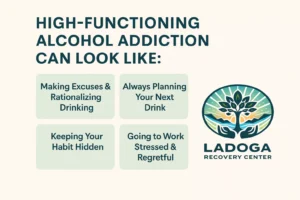You’ve heard it before—probably in your own head:
You’re not like those people. You’re fine.
You pay your bills. You make meetings. You might even be the one people lean on. There are no DUIs, no bar fights, no lost jobs. From the outside, you’ve got it handled.
But on the inside?
You’re not sleeping.
You’re drinking more than you meant to—again.
You’re starting to wonder how long you can keep this up.
At Ladoga Recovery Center’s alcohol addiction treatment program in Indiana, we meet people like you every day. People who aren’t in crisis—but know something’s wrong. People who live in the “in-between” space where alcohol hasn’t wrecked their life, but it’s quietly bleeding the color out of it.
This blog is about those people. And if you see yourself in their stories, that’s not something to be ashamed of. It’s something to pay attention to.
High-Functioning Doesn’t Mean It’s Not Alcohol Addiction
One of the biggest myths about addiction is that it always looks like disaster.
But high-functioning alcohol addiction is quieter. Slower. Sneakier.
It can look like:
- Always having a “reason” to drink (networking, stress relief, relaxing)
- Obsessing over when and how you’ll get your next drink—even if it looks casual
- Hiding how much you’re drinking from the people closest to you
- Waking up anxious, dehydrated, and full of self-recrimination—but still going to work on time
You’re not falling apart. But you’re not fully living either.
And that’s a valid reason to seek help.
“I Didn’t Look Like an Alcoholic. But I Felt Hollow.”
One client, a 36-year-old sales manager, described it like this:
“I had a great apartment, a solid job, a good relationship. But I’d come home, pour a drink, and feel like I was disappearing inside my own life. Like I was watching myself from outside.”
That feeling isn’t uncommon.
In fact, it’s one of the clearest signs something’s off.
You’re functioning—but the cost is rising.
And eventually, even if the outside stays intact, the inside starts to crack.

Why High-Performers Avoid Treatment (and Why That’s Changing)
If you’ve been successful in life, there’s a good chance you’ve convinced yourself that you can “handle it.” That willpower is enough. That other people need rehab—not you.
But here’s what we’ve learned from working with high-functioning adults:
It’s not that you lack discipline. It’s that alcohol is quietly rewiring how you relate to pressure, fatigue, joy, and stress.
And deep down, you might know this:
- You drink more when the stakes are high
- You’re using alcohol as a reward you can’t stop chasing
- You’re scared of what would happen if you stopped—even for a week
That fear? That’s where most people start. Not in total collapse, but in a quiet moment of truth.
What Alcohol Addiction Treatment Really Offers
At Ladoga Recovery Center, we’re not here to shame you or strip you of your independence. We’re here to offer structure, clarity, and real support for people who are ready to take a closer look—without burning their life down to do it.
Here’s what high-functioning clients typically find most valuable:
- Clinical therapy that’s direct, not condescending
You won’t be lectured. You’ll be met with curiosity and respect. - Time to breathe and think clearly
Whether you choose detox, inpatient, or outpatient care, you’ll finally have space to hear your own thoughts—without the buzz in the background. - Community that mirrors your experience
You won’t be the only one who kept everything “together” on the outside. You’ll hear stories that feel eerily close to yours. - Plans that fit your actual life
We don’t assume your goals—we ask. Whether it’s maintaining a job, parenting, or prepping for a career pivot, treatment is about support, not sacrifice.
What Happens When You Stop Performing and Start Feeling?
For high-functioning adults, sobriety isn’t just about taking away alcohol. It’s about facing what you’ve been drinking to avoid.
That might include:
- Anxiety you’ve been silencing with cocktails
- Grief you never gave yourself space to feel
- Pressure to succeed that’s tied to your identity
- Loneliness you’ve been masking with parties, networking, or overwork
In alcohol addiction treatment, you learn to sit with those feelings—at first with resistance, then with compassion. You learn you don’t have to fix everything. You just have to stop numbing it long enough to see what needs tending.
That’s where the healing begins.
Healing Isn’t About Losing Control—It’s About Getting It Back
Here’s what real recovery looks like for high-functioning adults:
- You wake up clear-headed—not just “not hungover,” but emotionally present.
- You reconnect with people who matter—and start showing up with your full self.
- You stop making excuses for little slips—and start making real choices.
- You regain your capacity for creativity, humor, sex, rest, and ambition—without the blur of booze.
It’s not dramatic. It’s steady. It’s sometimes awkward.
But it’s yours.
And when it clicks, it feels like coming home to yourself.
Real Recovery Stories from High-Functioning Clients
We’ve seen:
- A nurse who started with a “couple drinks to unwind” and ended up in detox after blacking out at a work retreat—but now runs her own sober mentorship group.
- A dad who realized he was more patient, present, and proud of himself without his nightly six-pack—and finally rebuilt trust with his teen.
- A software engineer who quietly tapered off with medical support, stayed in IOP, and now shares his story anonymously online to help others break the silence.
You won’t see these stories in tabloids. But they’re powerful. And they’re real.
FAQ: What High-Functioning Adults Want to Know About Treatment
How do I know if I need treatment if my life still looks okay?
If alcohol is something you’re hiding, planning around, or using to cope—and it’s affecting your mental clarity, relationships, or self-esteem—it’s enough. You don’t have to hit rock bottom.
Will I have to take time off work to get help?
Not always. We offer flexible outpatient options, including evening and part-time programs. Some clients start with detox or inpatient care, but many continue working while in treatment.
What if no one knows I drink this much?
You’re not alone. Many clients arrive without having told anyone. Our programs are confidential, and we help you decide when and how to share—if at all.
Is treatment just 12-step meetings and group therapy?
No. While group support is powerful, we also provide one-on-one therapy, medication-assisted treatment (if appropriate), and real-life planning to support sobriety in your world.
What if I’m not ready to commit to quitting completely?
That’s okay. You don’t have to be sure to start asking questions. We’ll help you explore your relationship with alcohol—and what change could look like on your terms.
Tired of managing what no one sees? We’re here when you’re ready.
Call (888) 628-6202 or visit Ladoga’s alcohol addiction treatment page to learn more about how we support high-functioning adults in breaking the silence—without losing everything to get there.

